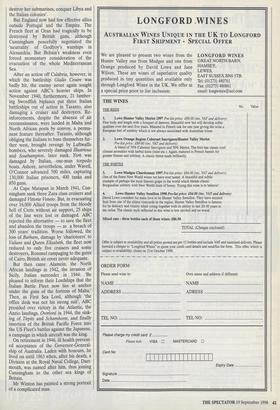The old man and the sea
John Colvin
CUNNINGHAM: THE GREATEST ADMIRAL SINCE NELSON by John Winton John Murray, £25, pp. 432 he formation of a professional naval officer before the last war is little remem- bered now. Entry to training ship or, later, naval college was mostly at 13 years, the education normal enough, but the disci- pline and culture based on a Service for which such gods as Jackie Fisher consid- ered 'the Archangel Gabriel only just good enough'. The defects of the Praetorian Guard — isolation, arrogance, authoritari- anism — were secondary to its virtues loyalty, pride, judgment. The authorities did not permit Nelson, his captains or their predecessors ever to be far from our minds.
Andrew Browne Cunningham, ABC, the system's exemplar, destroyer commander, twice Commander-in-Chief Mediterranean, First Sea Lord, was stubborn, domineering and abusive, 'contemptuous of big ships and staff work', a 'driver', even a bully, slow to acknowledge air power and innovations. But his juniors doubted if he realised what `he gave to those paddling in his wake'. They spoke of 'the inspiration of his leadership, the excitement of success, his sense of humour . . . He earned and gained the utmost loyalty.' In describing ABC's mastery of ship handling, one staff officer said, 'He showed a speed of decision and action such as I have never seen before.' Another believed that his own 'brain worked at a third of the speed of ABC's'. After Crete, the Admiral became tem- porarily 'the Butcher' but to the lower deck, he remained always 'the old man'.
This magnificent book is no panegyric. It is, rather, an account of his oddly pugna- cious childhood, his unusual marriage, of periods as Rear Admiral Destroyers and as second-in-command Mediterranean during the Ethiopian crisis and the Spanish civil war, before becoming C-in-C Mediter- ranean in June 1940. There his command comprised four battleships, a carrier, seven cruisers, three destroyer flotillas, one flotil- la each of submarines and MTBs, their bases Malta and Alexandria, numbers fluc- tuating wildly over years of battle. His task was 'to cut off Italy's supplies, interfere with communications, bombard her ports, destroy her submarines, conquer Libya and the Italian colonies'.
But England now had few effective allies outside Portugal and the Empire. The French fleet at Oran had tragically to be destroyed by British guns, although Cunningham peacefully negotiated the `neutrality' of Godfroy's warships in Alexandria. But Britain's weakness even forced momentary consideration of the evacuation of the whole Mediterranean Sea.
After an action off Calabria, however, in which the battleship Giulio Cesare was badly hit, the enemy never again sought action against ABC's heavier ships. In November 1940, furthermore, 21 lumber- ing Swordfish biplanes put three Italian battleships out of action in Taranto, also damaging a cruiser and destroyers. Re- inforcements, despite the absence of air reconnaissance, were landed in Malta and North African ports by convoy, a perma- nent feature thereafter. Taranto, although obliging the Italians to base themselves fur- ther west, brought revenge by Luftwaffe bombers, who severely damaged Illustrious and Southampton, later sunk. York was damaged by Italian, one-man torpedo boats. Ashore, nevertheless, under Wavell, O'Connor advanced 500 miles, capturing 130,000 Italian prisoners, 400 tanks and 850 guns.
At Cape Matapan in March 1941, Cun- ningham sank three Zara class cruisers and damaged Vittoria Veneto. But, in evacuating over 16,000 Allied troops from the bloody hell of Crete without air support, 25 ships of the line were lost or damaged. ABC rejected the alternative — to save the fleet and abandon the troops — as a breach of 300 years' tradition. Worse followed, the loss of Barham, damage by 'charioteers' to Valiant and Queen Elizabeth, the fleet now reduced to only five cruisers and some destroyers, Rommel rampaging to the gates of Cairo, British air cover never adequate.
But then came Alamein, the North African landings in 1942, the invasion of Sicily, Italian surrender in 1944: 'Be pleased to inform their Lordships that the Italian Battle Fleet now lies at anchor under the guns of the fortress of Malta.' Then, as First Sea Lord, although 'the office desk was not his strong suit', ABC presided over victory in the Atlantic, the Anzio landings, Overlord in 1944, the sink- ing of Tirpitz and Schamhorst, and finally insertion of the British Pacific Force into the US Fleet's battles against the Japanese, a campaign in which aircraft was the king.
On retirement in 1946, ill health prevent- ed acceptance of the Governor-General- ship of Australia. Laden with honours, he lived on until 1963 when, after his death, a Division at the Royal Naval College, Dart- mouth, was named after him, thus joining Cunningham to the other sea kings of Britain.
Mr Winton has painted a strong portrait of a complicated man.











































































 Previous page
Previous page